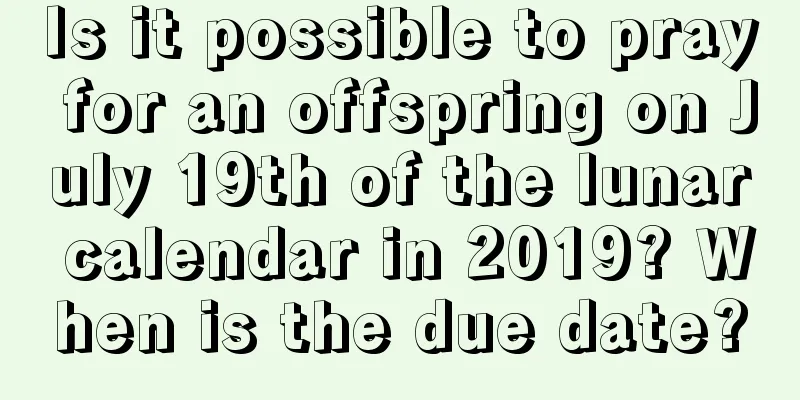What are the customs and taboos on the third day of the first lunar month?

Introduction: The third day of the first lunar month is the third day of the Spring Festival, and people are still immersed in the joyous New Year atmosphere. However, there are some customs and things you need to pay attention to on the third day of the first lunar month. So, what are the customs and taboos on the third day of the first lunar month? Now, let’s follow the editor to learn about it. The festive culture of the Chinese New Year is rich and colorful, and extraordinary. If you want to know more related content, just search in the Spring Festival special topic carefully compiled by Mr. Shui Mo!The third day of the lunar month: Sheep DayThe third day of the lunar month is the day when Nuwa created sheep, so it is called "Sheep Day". On this day, people cannot kill sheep. If the weather is good, it means that the sheep will be well raised in the year and the sheep farmers will have a good harvest.Customs and taboos on the third day of the Lunar New Year:1. The third day of the Chinese New Year is also known as "Red Dog Day". It is an unlucky day and it is taboo to pay New Year's greetings. Red Dog is an angry god and encountering it will bring misfortune. Therefore, people usually stay at home on this day to avoid encountering evil spirits. Therefore, it is not advisable to go out or pay New Year's greetings, whether to relatives or friends' homes. If anything bad happens to this family in the future, they will blame you for the rest of their lives. Of course, this also depends on local customs. For example, in some places in Jiangxi, the first day is for sons, the second day is for husbands, and the third and fourth days are for visiting all directions. That is, on the first day, one should go to one's parents' home, on the second day, one should go to one's father-in-law's home, and on the third and fourth days, one should go out to wish others a happy new year. However, if a family member has passed away that year, one cannot go to wish others a happy new year, nor accept others' greetings.2. The third day of the Lunar New Year is also called the Little New Year, or Tianqing Festival. On this day, people do not sweep the floor, beg for fire, or draw water. Legend has it that it was a court festival in the Song Dynasty. In the first year of Dazhong Xiangfu during the reign of Emperor Zhenzong of Song, it was said that a book from heaven had descended to the earth, so Emperor Zhenzong issued an edict to designate the third day of the first lunar month as Tianqing Festival, and officials were given a five-day holiday. Later it was called Xiaonianchao, and people did not sweep the floor, beg for fire or draw water, just like Suichao. In southern China, people put up a "red mouth" sign on the morning of the third day of the Lunar New Year, as it is believed that quarrels are likely to occur on this day and it is not appropriate to pay New Year's greetings. The so-called "red mouth" is usually a red paper strip about seven or eight inches long and one inch wide, with some auspicious words about safety and good luck written on it (the content has a certain format, for example: "On the third day of the first lunar month in the year of Jiashu in 1994, when incense is burned in front of the gods, the nails at the front door will be broken, and all men and women will be red-mouthed, thieves will steal, and all disasters will be turned into heaven, wishing good luck") and posted on the top of the front and back doors. Another piece is placed on top of the garbage and taken out to be thrown away. These garbage are accumulated on the first and second days of the New Year. They must be cleaned up and thrown away on the third day. Otherwise, it would be like letting the gold, silver and treasures in the house flow out. In short, pasting the "Red Mouth" is to make people feel psychologically that they can travel safely throughout the year, without quarrels with others or various unfortunate disasters, and the family will have more wealth and treasure, and everything will be as they wish. 3. It is taboo to light lamps on the third day of the Lunar New Year when mice get married. This day is the day of "mice's wedding". People must turn off the lights and go to bed early after nightfall to allow the mouse family to hold the wedding. Salt and rice are also scattered throughout the house, which is called "mice dividing money". In the past, the house would be brightly lit for three consecutive days during the Chinese New Year, starting from New Year’s Eve to the second day of the New Year. For three days, all the lights in the house would be turned on, symbolizing a prosperous family. However, on the third day of the New Year, except for the lights for normal lighting, all other lights do not need to be brightly lit. 4. On the third day of the Lunar New Year, people usually do not go out to pay New Year’s greetings because it is a red-mouthed day, so people hope to avoid quarrels with others. 5. In northern China, such as Hebei, people go to the graves to burn paper on the third day of the Lunar New Year, and then visit relatives. Parents will not fully entertain their married daughters and sons-in-law who come back to visit. 6. The third day of the first lunar month is the birthday of millet: According to physiognomy, the third day of the first lunar month is the birthday of millet. On this day, people offer sacrifices and pray for a good harvest, and do not eat rice. 7. Burning door god paper on the third day of the Lunar New Year: On the third day of the Lunar New Year, the pine and cypress branches used during the New Year and the door god paper hung during the festival are burned together to show that the new year has passed and it is time to start a new life. There is a proverb that goes "After burning the door god paper, you will have trouble finding your own way." Summary: Through the above article, we know some customs and taboos about the third day of the first lunar month. I hope these contents can provide some reference for everyone. I wish you all a prosperous new year and all the best! |
Recommend
What are the do's and don'ts for New Year's Day 2021? Which three days are the New Year's Day holiday in 2021?
Introduction: Every day has its own do’s and don’t...
When is the Summer Solstice in 2021? Is it possible to get married on the Summer Solstice?
Deer antlers fall off, cicadas start to chirp, and...
The 22nd day of the twelfth lunar month in 2017 is a good day according to the lunar calendar.
The weather is covered in snow, but the cold clim...
What is the fate of a boy born on February 21st of the lunar calendar in 2020? Is today a good day?
Introduction: A new life is born every day, and th...
What is the fate of the eleventh month of the lunar calendar? Fate analysis of the eleventh month of the lunar calendar!
Introduction: New life is born every month, and pe...
Is it suitable to travel far during the Flower Festival in 2019? Is the Flower Festival suitable for outing?
Is it suitable to travel far during the Flower Fes...
Is October 11, 2019, the day before the Beginning of Winter a good day? What is the meaning of eating dumplings on the Beginning of Winter?
Introduction: Every day has its good and bad luck,...
Is the fifteenth day of the twelfth lunar month a good day to move into new house in 2019? Is today a good day to move?
Moving is based on the lunar calendar. You can mov...
On which day of the lunar calendar is the Ghost Festival? When is the Ghost Festival?
Although everyone knows about the Ghost Festival, ...
Mother's Day 2020 - Is April 18 an auspicious day for repairing graves? Analysis of the good and bad luck of the hexagram on May 10!
Introduction: Generally, it is necessary to choose...
Is the second day of July 2020 a suitable day for worship? Check the lucky position of the God of Wealth on August 20
Introduction: Generally, it is necessary to choose...
Do Rooster babies born on November 22, 2017 have good fortunes?
Everyone's birth time is slightly different, a...
2020 Lunar calendar leap year 43rd lunar calendar, hexagram
The 43rd day of the lunar leap year in 2020, the ...
Can I move on the 30th day of the first lunar month in 2019? Is it a good time to move into a new house?
Shuimoxiansheng.com has carefully compiled detail...
Is it not suitable to have sex on the day before the Spring Equinox in 2020? What are the solar terms before and after the Spring Equinox?
Introduction: Sometimes you need to choose an ausp...









